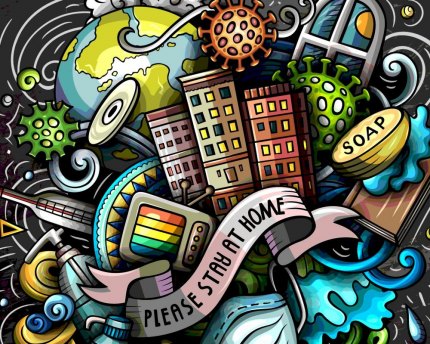
A sustained effort is needed to improve the climate.
-- M. Stiles, Meriden, Connecticut
The coronavirus pandemic certainly led to a decrease in industrial activity and resulting greenhouse gas emissions during its reign over the planet in 2020. A study by German researchers calculated that global carbon dioxide emissions fell by about 8 percent over the past year. While this is no doubt a good result from an otherwise bad situation, the researchers warn it represents nothing but a small drop in the bucket compared with what we still need to accomplish—even bigger annual emissions drops every year for decades to come—to avert cataclysmic climate change.
According to study co-author Ralf Sussmann, we would need to achieve zero emissions around the world by 2055 to limit global warming at 1.5 degrees Celsius. The declining rate of greenhouse gas emissions during the global pandemic would not only need to be upheld but would have to be amplified to achieve zero emissions. Sussmann and other study authors stated that to achieve these reductions “political measures have to be taken to directly initiate fundamental technological changes in the energy and transport sectors.”
Despite the drop in emissions during this past year, 2020 will likely go down in history as the year climate change’s effects started to really accelerate. Recent increases in both the frequency and intensity of extreme weather events are consequences of global climate change. “Global warming can contribute to the intensity of heat waves… Increasing temperatures mean a longer wildfire season,” reports the National Academies of Sciences, Engineering, and Medicine. “Global warming also increases water vapor in the atmosphere, which can lead to more frequent heavy rain and snowstorms.” This means stronger hurricanes and flooding.
In 2020, extreme weather events plagued people around the world amid the pandemic. In the U.S. alone, Americans witnessed orange skies clouded with smoke and a number of powerful hurricanes coming from the Atlantic. Globally, there have been record high average temperatures, double the activity of a normal hurricane season, the hottest temperature ever reliably recorded in human history (54 degrees Celsius, 129 degrees Fahrenheit), the most costly damages from flooding in China, record low Arctic sea ice, and the strongest tropical cyclone to hit land that has ever been recorded (Super Typhoon Goni). These abnormally extreme weather events are all indicators of the accelerating effects of climate change on our planet.
Even though climate change continues to worsen, in small ways all over the world nature has taken this economic slowdown as a chance to breathe. For example, the murky waters of Venice’s canals became clearer than they had been in decades—and sea life even returned to the city’s urban waterways. While global warming has not stopped because of the global pandemic, we have learned that Mother Nature responds positively to our improved behavior (even when not intended), which gives environmental advocates hope to keep on working. It’s now up to every one of us to make significant changes in our own orbits—perhaps by keeping up our slower and more stationary existences even after we have a grip on coronavirus—if we hope to mitigate and reverse the effects of climate change.
This column was reprinted with permission. EarthTalk is produced by Roddy Scheer and Doug Moss and is a registered trademark of the nonprofit Earth Action Network. To donate, visit www.earthtalk.org. Send questions to: question@earthtalk.org.